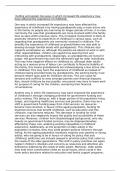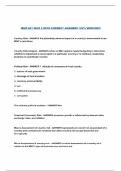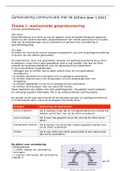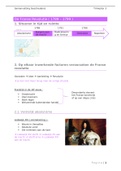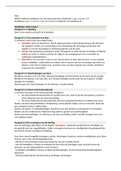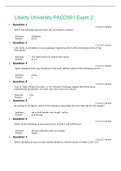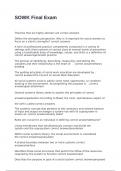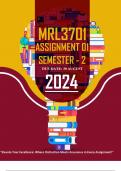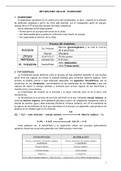Outline and explain two ways in which increased life expectancy may
have affected the experience of childhood:
One way in which increased life expectancy may have affected the
experience of childhood is by having grandparents play a more active role
in the family. As people are now living for longer periods of time, it is more
commonly the case that grandparents are more involved within the family
than as seen within previous years. This increased involvement is likely to
positively influence to experience of childhood in various ways, such as
regarding that grandparents are commonly involved in childcare. The
benefits the experience of childhood as grandchildren are now able to
develop stronger familial bonds with grandparents. This childcare also
supports socialisation as, although the parents are absent at work or with
other responsibilities, children can spend time learning from and
interacting with grandparents. Opposingly, as grandparents are living for
longer, the government has risen the retirement age for older individuals.
This may have negative effects on childhood as, although older adults
acting as a reserve army of labour can contribute to financial stability of
the family, this means grandparents are instead playing a less active role
in childhood. This may harm the experience of childhood as instead of
childcare being provided freely by grandparents, the working family must
become reliant upon paid for childcare services. This can cause for
tensions and conflicts to arise amongst parents over financial disputes.
Also, should childcare be inaccessible, one parent may have to leave work
for purpose of caring for the children, worsening their financial
circumstances.
Another way in which life expectancy may have impacted the experience
of childhood is through changing prioritise for government funding and
policy making. This being as, with a larger portion of the population living
longer, and requiring healthcare services and pensions, there may be a
shift in government funding away from child services. As resources
become more strained, in favour of the ageing population, funding for
essential services that benefit childhood, such as education and free
childcare, may become reduced. This decrease in funding for child
services can also negatively impact the quality and accessibility of these
services. Moreover, children from disadvantaged backgrounds, who rely
heavily on government funded services, may be disproportionately
affected by these cuts, widening existing inequalities in childhood
experience. Additionally, as the proportion of older adults in the
population increases, they may wield greater political influence through
voting. As the ageing population maintains majority over parents or young
adults, who are going to be in favour of voting for policy that aids
childhood, politicians are instead swayed to prioritise policy that caters to
the needs of the older generations. This shift in policy prioritise can again
neglect children’s interests and concerns as resources and attention are
directed to addressing the needs of older adults. Moreover, older adults
may hold more conservative views on social issues, which could in fact
harm policy decisions related to education and family support programs,
, in ways that may not be beneficial for children. Consequently, increased
life expectancy can go onto negatively impact childhood as children may
face challenges in accessing adequate resources and support, hindering
their development and well-being.
‘People have more choice than in the past over who they can be in
personal relationships with. They also have more choices when a
relationship ends.
This increased choice in personal life has affected family structures in the
UK today.’
Applying material from the item, analyse two effects that increased choice
in personal life have on family structures in the UK today:
One effect that increased choice in personal life has had on family
structures is regarding separation and divorce, as individuals ‘have more
choices when a relationship ends’. This being as, in modern day society,
people having more choices in personal life has meant that obtaining a
divorce or terminating a relationship has become more accessible. Smart
arguing that the increased fluidity of personal relationships have become
characteristic of modern family life. With individuals having more
autonomy in their personal relationships, they are more likely to end
unsatisfactory partnerships, rather than staying together unhappily. This
meaning that in the UK today, there are many more single parent families,
as when one individual is unhappy, instead of staying together for the
children, couples are more likely to divorce. This also means that there are
more stepfamilies as, due to there being increased personal choice,
individuals are choosing to get remarried to another individual who is
better suited to their needs and desires. Moreover, the stigma surrounding
divorce has decreased over time, contributing to more people feeling
empowered to end relationships that are no longer fulfilling. As a result,
family structures in the UK today are more diverse and dynamic, reflecting
the changing landscape of personal relationships.
Another effect that increased choice in personal life has had on family
structures is that ‘people have more choice than in the past over who they
can be in personal relationships with’. Influential sociologist Beck
introducing the concept of the ‘individualisation thesis’, which suggest
that individuals have greater freedom to shape their personal lives
according to their own preferences or desire. In the past, societal norms
and expectations, alongside little choice in personal life, dictated narrow
definitions of acceptable family structures, often excluding non-traditional
arrangements. However, as people have gained more autonomy in
choosing their partners and forming relationships based on mutual
compatibility, rather than societal norms, there has been a shift towards
greater acceptance of diverse family configurations. This has changed
family structures in various ways, one link is regarding that, traditionally,
it was frowned upon for individuals to be in homosexual relationships.
have affected the experience of childhood:
One way in which increased life expectancy may have affected the
experience of childhood is by having grandparents play a more active role
in the family. As people are now living for longer periods of time, it is more
commonly the case that grandparents are more involved within the family
than as seen within previous years. This increased involvement is likely to
positively influence to experience of childhood in various ways, such as
regarding that grandparents are commonly involved in childcare. The
benefits the experience of childhood as grandchildren are now able to
develop stronger familial bonds with grandparents. This childcare also
supports socialisation as, although the parents are absent at work or with
other responsibilities, children can spend time learning from and
interacting with grandparents. Opposingly, as grandparents are living for
longer, the government has risen the retirement age for older individuals.
This may have negative effects on childhood as, although older adults
acting as a reserve army of labour can contribute to financial stability of
the family, this means grandparents are instead playing a less active role
in childhood. This may harm the experience of childhood as instead of
childcare being provided freely by grandparents, the working family must
become reliant upon paid for childcare services. This can cause for
tensions and conflicts to arise amongst parents over financial disputes.
Also, should childcare be inaccessible, one parent may have to leave work
for purpose of caring for the children, worsening their financial
circumstances.
Another way in which life expectancy may have impacted the experience
of childhood is through changing prioritise for government funding and
policy making. This being as, with a larger portion of the population living
longer, and requiring healthcare services and pensions, there may be a
shift in government funding away from child services. As resources
become more strained, in favour of the ageing population, funding for
essential services that benefit childhood, such as education and free
childcare, may become reduced. This decrease in funding for child
services can also negatively impact the quality and accessibility of these
services. Moreover, children from disadvantaged backgrounds, who rely
heavily on government funded services, may be disproportionately
affected by these cuts, widening existing inequalities in childhood
experience. Additionally, as the proportion of older adults in the
population increases, they may wield greater political influence through
voting. As the ageing population maintains majority over parents or young
adults, who are going to be in favour of voting for policy that aids
childhood, politicians are instead swayed to prioritise policy that caters to
the needs of the older generations. This shift in policy prioritise can again
neglect children’s interests and concerns as resources and attention are
directed to addressing the needs of older adults. Moreover, older adults
may hold more conservative views on social issues, which could in fact
harm policy decisions related to education and family support programs,
, in ways that may not be beneficial for children. Consequently, increased
life expectancy can go onto negatively impact childhood as children may
face challenges in accessing adequate resources and support, hindering
their development and well-being.
‘People have more choice than in the past over who they can be in
personal relationships with. They also have more choices when a
relationship ends.
This increased choice in personal life has affected family structures in the
UK today.’
Applying material from the item, analyse two effects that increased choice
in personal life have on family structures in the UK today:
One effect that increased choice in personal life has had on family
structures is regarding separation and divorce, as individuals ‘have more
choices when a relationship ends’. This being as, in modern day society,
people having more choices in personal life has meant that obtaining a
divorce or terminating a relationship has become more accessible. Smart
arguing that the increased fluidity of personal relationships have become
characteristic of modern family life. With individuals having more
autonomy in their personal relationships, they are more likely to end
unsatisfactory partnerships, rather than staying together unhappily. This
meaning that in the UK today, there are many more single parent families,
as when one individual is unhappy, instead of staying together for the
children, couples are more likely to divorce. This also means that there are
more stepfamilies as, due to there being increased personal choice,
individuals are choosing to get remarried to another individual who is
better suited to their needs and desires. Moreover, the stigma surrounding
divorce has decreased over time, contributing to more people feeling
empowered to end relationships that are no longer fulfilling. As a result,
family structures in the UK today are more diverse and dynamic, reflecting
the changing landscape of personal relationships.
Another effect that increased choice in personal life has had on family
structures is that ‘people have more choice than in the past over who they
can be in personal relationships with’. Influential sociologist Beck
introducing the concept of the ‘individualisation thesis’, which suggest
that individuals have greater freedom to shape their personal lives
according to their own preferences or desire. In the past, societal norms
and expectations, alongside little choice in personal life, dictated narrow
definitions of acceptable family structures, often excluding non-traditional
arrangements. However, as people have gained more autonomy in
choosing their partners and forming relationships based on mutual
compatibility, rather than societal norms, there has been a shift towards
greater acceptance of diverse family configurations. This has changed
family structures in various ways, one link is regarding that, traditionally,
it was frowned upon for individuals to be in homosexual relationships.

